Are You Using Cannabis LED Lights Wrong? Here Are Top Mistakes You Should Avoid
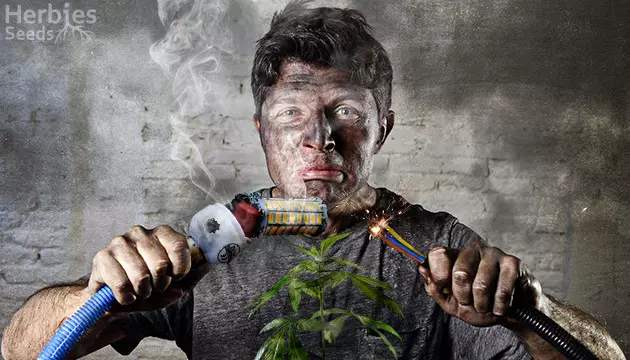
For the next entry in our series of articles dedicated to indoor growing, we’re covering some common mistakes that growers make when using LED lights. Using an LED grow light for cannabis has plenty of benefits. However, there are several miscalculations that marijuana cultivators may make when trying to utilize these tools. Here are the most frequent ones.
Picking The Wrong LED Grow Light
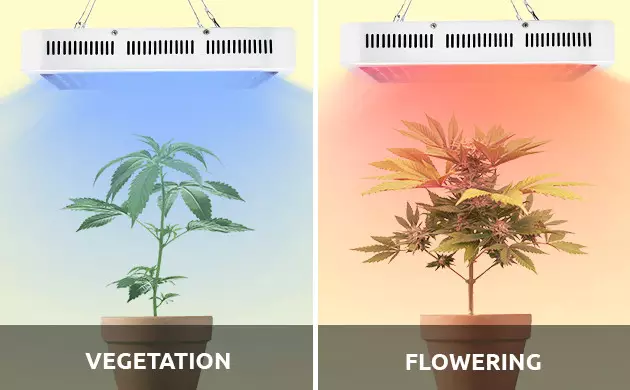
One common mistake that many growers make is picking the wrong LED light for the task at hand. “LED light” doesn’t actually refer to a single type of grow lamp. Instead, it’s an umbrella term that covers an entire genre of lights that all use similar technology.
Some LED lights give off light that contains more wavelengths of one color than another. In other words, some of these grow lamps give off redder light, while some give off bluer light. Still others are full-spectrum LED grow lights, which emit all colors equally.
The type of LED light that’s best for your grow will depend on how old the plants are inside it. Gardeners searching for the perfect LED veg light should seek bluer hues. In contrast, gardens growing plants in the flowering phase need more red-spectrum light. If you’re planning on using the same LED grow light for veg and flower, full-spectrum lamps are the best.
Picking Low-Quality LED Lights
There’s an old saying among many professional growers: buy it nice or buy it twice. If you choose low-quality lights, you’re asking for trouble.
Part of this problem stems from the fact that LED lights are expensive. In fact, they’re generally some of the most expensive grow lights on the market, so newer growers may be tempted to buy an inexpensive light to save money.
However, this is a mistake. Buying a cheap LED grow light is a recipe for disaster. Often, they’re made overseas. As a result, some manufacturers don’t build them to the same safety and quality standards.
Often, a manufacturer will list a light as being more powerful than it actually is. When that happens, a lamp can’t provide enough light to nourish plants, which die as a result. In contrast, some low-quality LED grow lights can actually be dangerous and may cause fires. Bottom line: don’t skimp when it comes to LED lights!
Picking Weak Or Beginner LEDs
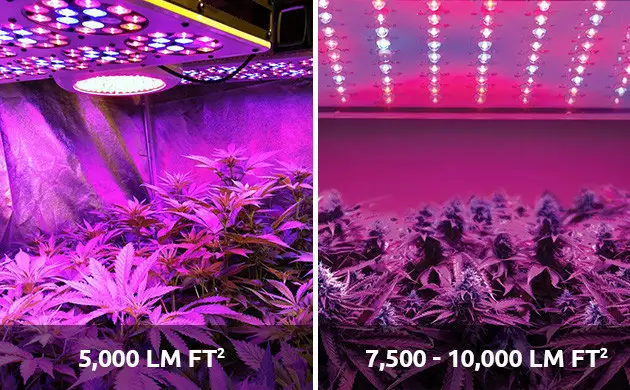
While it may not be a particularly honest way to do business, many manufactures of LED grow panels will try to take advantage of newer growers. Often, companies will try to mislead a grower with statistics taken out of context.
For example, most types of grow lights measure their power in wattage. This makes sense at first – nearly every other type of grow light, like HPS lamps, use watts to quantify their power.
However, wattage isn’t a particularly accurate way to measure the power of an LED light. Instead, it’s better to measure LED lights in lumens. These units measure actual light intensity rather than the power a light uses.
Don’t fall victim to these kinds of tricks – cannabis requires at least 2,500 lumens per square foot to grow. If this number is any lower, your plant won’t grow! In the vegetative stage, the perfect light intensity for cannabis is around 5,000 lumens per square foot, while a flowering plant can take as much as 7,500-10,000 lumens per square foot.
Not Setting Up The Light Schedule
It seems like this should be a no-brainer, but many growers forget to set up their light schedule when using an LED grow light for cannabis. You need to set up a proper light schedule in order for your plants to grow properly.
Photoperiodic strains need 18 hours of light per day to maintain their veg cycle and 12 hours of light per day to initiate flowering. Alternatively, you can grow autoflowering strains under a constant 16-18 to 20 to even 24 hours of light per day, as these plants will switch between veg and flower automatically.
Placing LED Lights Too Far Or Too Close To Weed Plants
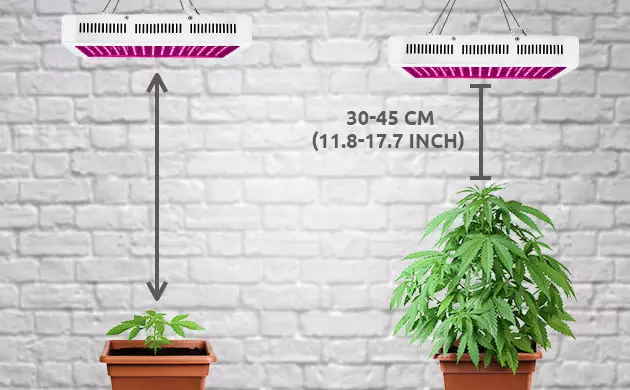
This is a pretty easy mistake to make, especially for newer growers. Placing your light source at an improper distance from your plants can be a critical error. Set your LED lamp too far away and your plants won’t get the light they need. The opposite is also true. Can LED grow lights burn plants if they’re too close? Absolutely.
So where should you put your lights, then? Unfortunately, there’s no easy answer to this question. There are tons of variables that will determine your ideal distance, and this will change depending on your light’s manufacturer.
Before you try anything else, check to see if your light came with an instruction booklet. They usually do, and this can save you countless hours of heartache. If your light didn’t come with a manual, check the manufacturer’s website for more information.
If you still can’t find anything, don’t panic. Generally, it’s a good idea to keep an LED light about 30-45 centimeters (11.8-17.7 inches) away from your canopy. Start with a longer LED grow light distance for seedlings and gradually close the distance as your plants mature.
Overwatering Cannabis That’s Under LEDs
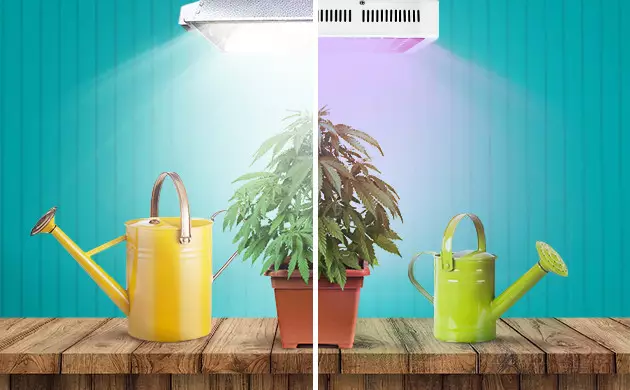
Here’s another common issue that newbies will cite when you ask them what’s bad about LED lights. Since LED lights put off less heat than HPS or CMH do, plants naturally need less water under LED lights. However, many growers will continue to water them the same amount. This usually leads to overwatering, which presents its own slew of problems.
Wet root systems become breeding grounds for bacteria, bugs, and fungi. They also open the door to nearly every nutrient deficiency in the book. To avoid this, reduce the amount of water you’re feeding your plants if switching over to LEDs from a different type of light.
LEDs Are Lovely – Use Them Right!
Using an LED grow light for cannabis has countless advantages. It does take a little bit of know-how to avoid some common pitfalls, though. Keep the information in this post fresh if you’re switching to LED lights in your grow. Long-term, nothing beats LED lights. Stick with them and you’ll soon get the hang of them!
Herbies Head Shop expressly refuses to support the use, production, or supply of illegal substances. For more details read our Legal Disclaimer.
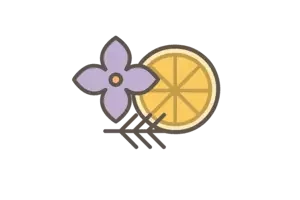



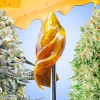
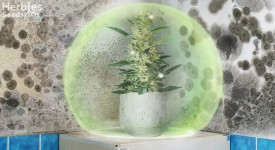
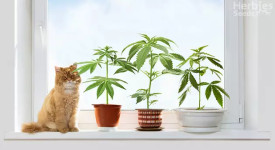
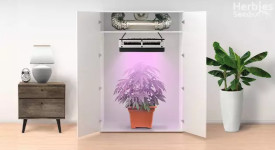
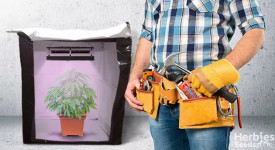
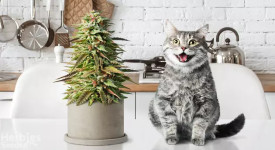

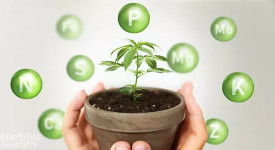


Thank you for leaving a comment for us!
Your feedback will be posted shortly after our moderator checks it.
Please note that we don’t publish reviews that: